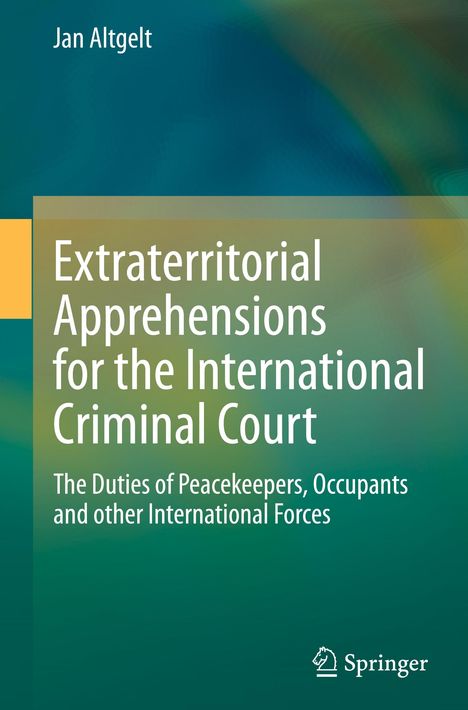Jan Altgelt: Extraterritorial Apprehensions for the International Criminal Court
Extraterritorial Apprehensions for the International Criminal Court
Buch
- The Duties of Peacekeepers, Occupants and other International Forces
- Springer International Publishing, 02/2024
- Einband: Gebunden, HC runder Rücken kaschiert
- Sprache: Englisch
- ISBN-13: 9783031458958
- Artikelnummer: 11759042
- Umfang: 268 Seiten
- Nummer der Auflage: 24001
- Auflage: 1st ed. 2024
- Gewicht: 571 g
- Maße: 241 x 160 mm
- Stärke: 21 mm
- Erscheinungstermin: 9.2.2024
Achtung: Artikel ist nicht in deutscher Sprache!
Klappentext
The starting point of this book is the generally shared observation that in violence-torn areas of limited statehood, the civilian population is often subject to deliberate attacks. This violence often escalates to core crimes such as war crimes, crimes against humanity and even genocide. The International Criminal Court (ICC) could potentially deter such crimes. In order to do so, it largely depends on the cooperation of the states on the territory of which alleged core criminals operate. Since such states are often unwilling or unable to cooperate, the book explores whether the ICC could instead seek assistance from international forces such as UN peace support operations, UN-mandated missions, and belligerent occupants.The book covers, on the one hand, the law and practice of the UN Security Council with regard to mandating international forces to arrest and transfer alleged offenders to the ICC or to other international courts. On the other, it addresses to what extent international forces may or must hand alleged offenders over to the ICC, regardless of such mandates. More precisely, the book examines whether the duties to prosecute genocide, torture, enforced disappearance, grave breaches and other war crimes apply extraterritorially and if so whether international forces can discharge these duties by transferring suspects to the ICC.
At the same time, the book addresses the limitations to such extraterritorial action: firstly, to what extent the prohibition of the use of force and the principle of territorial sovereignty restrict extraterritorial deprivations of liberty and transfer to the ICC. Secondly, it explores the restrictions and permissions that the law of occupation and other norms of international humanitarian law impose on such apprehensions and transfers. Finally, it discusses how international forces can uphold the right to liberty and security as well as the principle of non-refoulementwhen they extraterritorially apprehend ICC suspects. This also reflects the book s relevance with regard to the more general debate on the extraterritorial application of human rights.


